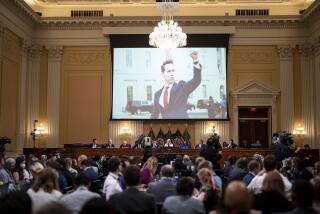When Chivalry Is Not Chauvinism : Men: Must they be either wimps or barbarians? Today’s ‘feel-right’ mores seem to produce only one or the other.
- Share via
“What’s happening to men today?” a feminist friend asked. I expected a lecture on how my gender is to blame for woes ranging from dog bites to ozone depletion. “They’re either wimps or barbarians,” she said.
This made me think of C.S. Lewis, my favorite writer, who was portrayed by Anthony Hopkins in the movie “Shadowlands.” In “The Necessity of Chivalry,” penned five decades ago, Lewis echoed my friend’s view. Males, he argued, tend to fall into “two sections, those who can deal with blood and iron [in war] but cannot be ‘meek in hall’ [around women and children] and those who are ‘meek in hall’ but useless in battle.” They are by nature either “stern” or “meek.” In other words, barbarians or wimps.
This brings to mind two particular men--O.J. Simpson and Jimmy Carter.
People once knew Simpson as an ex-football star famed for crashing into, hurdling over and otherwise eluding girthy linemen with names like Mean Joe Greene. Talent, yes, but also bravery comes to mind.
Today, they picture a man who apparently beat his wife and perhaps murdered her.
As Lewis noted in his essay, we moderns assume that bullies are always cowards and thus “a truly brave man is always gentle.” Indeed, if someone were to ask the man on the street, “Is O.J. a brave man?” the likely retort would be, “Of course not. Only cowards beat women.” The problem with this thinking, according to Lewis, is this: “It represents as a natural fact something which is really [an] ideal . . . .” History and experience refute the idea that fearlessness and gentleness naturally combine in one person. “Brave football hero” and “wife-beater” are not mutually exclusive. Fearlessness implies toughness, and one can be as tough on one’s wife as on a would-be tackler on the gridiron.
While O.J. Simpson appears to approximate Lewis’ stern man, Jimmy Carter seems to fit the “meek” mold. It is hard to imagine the ex-President giving Rosalyn Carter a black eye. Carter’s problem is not that he lacks gentleness, but that there is no warrior in him. With American guns trained on Haitian honcho Raoul Cedras, Carter was able to get him to step down. But as President, he balked at using military might to help free American hostages in Iran. There, his efforts foundered, largely because Iran required a credible threat of force to be persuaded.
Simpson and Carter might be--in radically opposite ways--”natural” men. What society needs more of, according to Lewis, is men who transcend nature, “who combine both characters.” This ideal combination, “the [chivalrous] knight,” is, Lewis stressed, “a work not of nature but of art,” “something that needs to be achieved, not something that can be relied on to happen.”
Naturalistic to its core, post-1960s liberal and feminist ideology has invariably asserted the opposite. Deeming chivalry “male chauvinism,” it favored letting males break free of it so they could be “themselves.” As chivalry declined in the 1970s and 1980s, what emerged was simply self-expression. Meek boys were urged not to be more tough or brave, but “who they really are.” As for stern boys, a culture that was becoming increasingly permissive hardly possessed the will to discipline them. Parents heeded Dr. Spock, not Dr. Lewis, and so the meek weren’t taught courage or toughness, nor the stern gentleness, fairness or compassion.
Popular culture has long been aiding and abetting this process. Parts of it have lauded meekness, first through anti-hero roles played by, among others, Woody Allen. “Courage” here meant castigating male aggressiveness, no matter the context. The other side of pop culture tied maleness to a stern ideal that sanctified raw physicality, sexual prowess and brute force.
In short, our culture has succumbed to a pernicious lie--that society must choose between meekness and sternness as suitable ideals for young males to follow. My friend is right: We are now mass-producing males who are either brutal or soft--”wolves who do not understand, and sheep who cannot defend, the things which make life desirable,” as Lewis feared.
Yes, if left to ourselves, we males tend to be wolves or sheep. But should society again come to prize self-discipline over self-expression, embracing transcendent values over whatever “feels” right, we just might produce shepherds and knights again.
Will this sit well with feminists? Some might call such men “male chauvinist pigs”--rejecting their strong side as warlike and evil and their gentle side as antiquated, dull and patronizing. But I suspect that, as with my female friend, most will liken this development to awakening from a bad dream, which for them today is reality.
More to Read
Only good movies
Get the Indie Focus newsletter, Mark Olsen's weekly guide to the world of cinema.
You may occasionally receive promotional content from the Los Angeles Times.










